What is an Employer of Record Philippines?
An Employer of Record in the Philippines is a third party that manages an organization’s employees. This includes onboarding, contract management, payroll management, ongoing HR support and offboarding.
An EOR acts as the official employer of an organization’s employees and is responsible for managing payroll, benefits administration, tax withholding and compliance with labor laws.
This is the ideal HR solution for businesses that quickly want to scale without setting up a legal entity in the Philippines while staying compliant with local labor laws and regulations.
Overview of the Employment Landscape in the Philippines
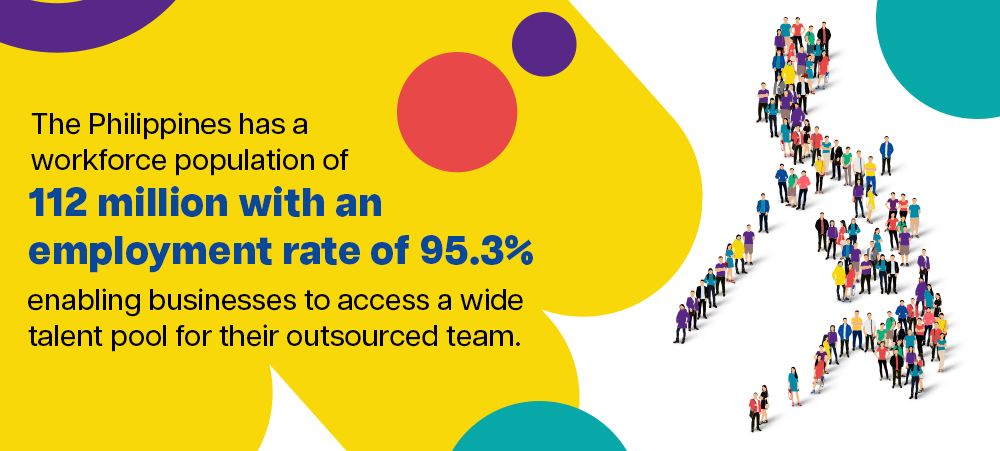
The Philippines has a workforce population of 112 million with an employment rate of 95.3%, enabling businesses to access a wide talent pool for their outsourced team.
According to the Philippine Market Report: Shared Services State of the Industry 2023 by Shared Services and Outsourcing Network (SSON), the Philippines has a significantly larger population of individuals with university bachelor's degrees than Kuala Lumpur, Warsaw or even Chicago.
This gives the Philippines a competitive edge as a leading location for global shared services activities.
Benefits of hiring in the Philippines
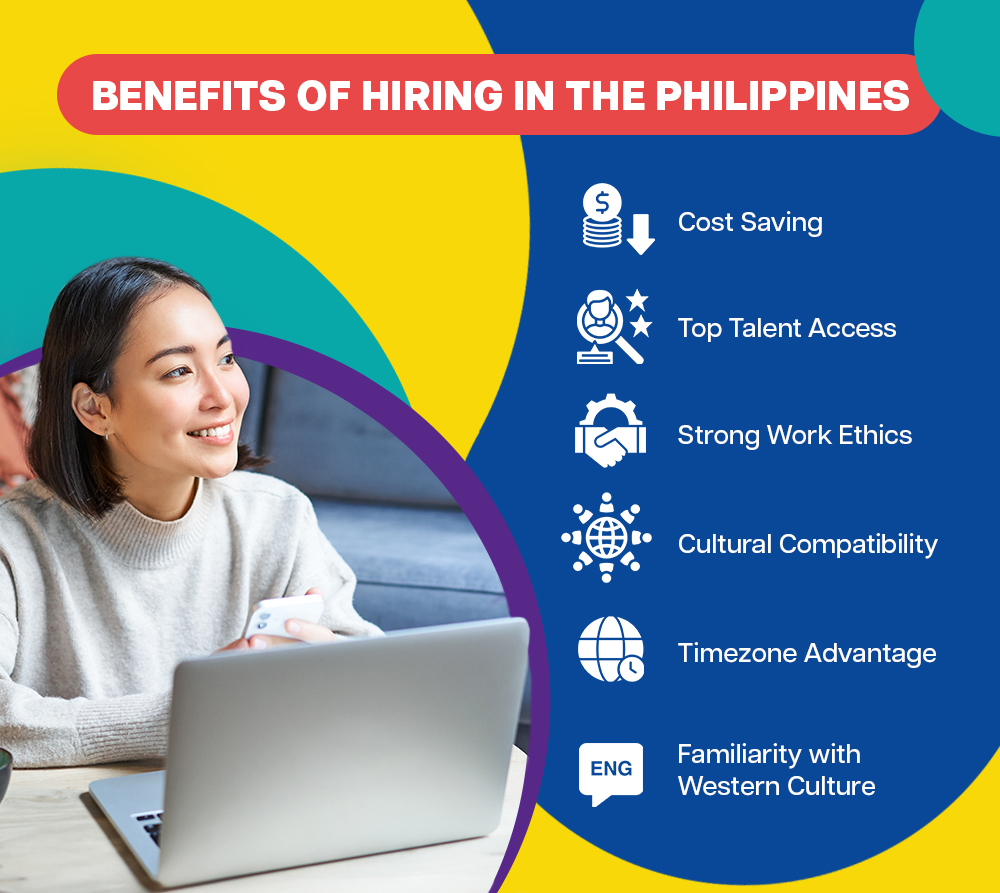
You can experience the following benefits by hiring your staff in the Philippines.
Cost savings
The Philippines has relatively low labor costs compared to developed countries while maintaining the quality of talent in the workforce.
Access to top talent
The Philippines workforce is predominantly highly educated, equipping Filipino employees with the necessary skills and expertise to perform in different positions, especially in specialized fields.
Strong work ethic
Filipinos value hard work, diligence and commitment to family and their communities. Filipino employees are also known to be loyal and dedicated to their employees if they belong to a fulfilling work environment.
Cultural compatibility
Filipino employees are known for their warm hospitality, adaptability and resilience. These qualities allow them to thrive in different work environments and successfully work alongside an international team.
Timezone advantage
The Philippine workforce is geared towards working in a timezone-neutral environment. Many employees are open to working “day shifts” or “night shifts”, ensuring that they cover working hours, regardless of a business’s location.
Familiarity with Western culture
Its history of colonization from Western countries gives Filipino employees a deep understanding of Western culture, allowing them to adapt to different work settings.
Importance of Employer of Record Services
An EOR supports international organizations in managing remote employees based in different locations.
An Employer of Record functions as an independent legal entity for employment purposes. The staff you hire are employed under your EOR on paper, which is crucial for international employment purposes. It allows you to legally outsource employees without having to set up an entity in the country.
Partnering with an EOR enables you to focus on developing your core competencies rather than being bogged down by administrative tasks.
Exploring the Role of an EOR
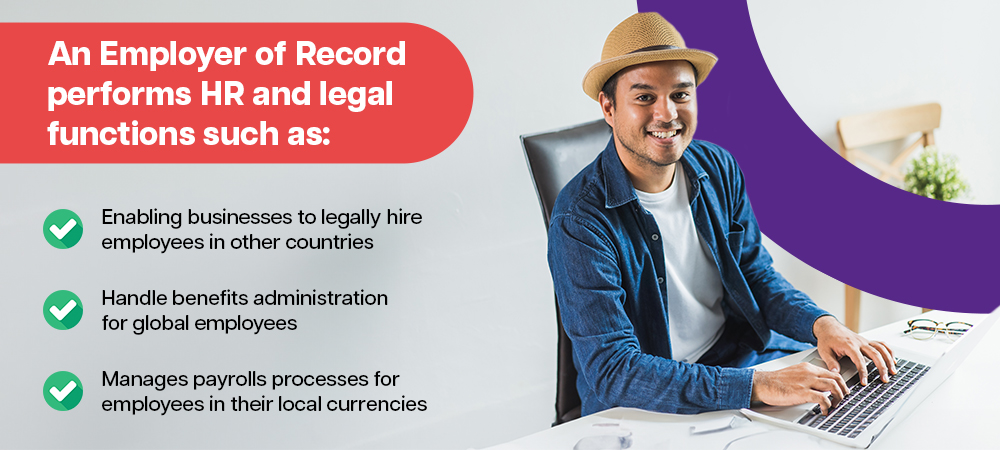
An Employer of Record performs HR and legal functions such as:
- Enabling businesses to legally hire employees in other countries
- Handle benefits administration for global employees
- Manages payrolls processes for employees in their local currencies
While an EOR is the employer of your staff on paper, they are not involved in the day-to-day work life of your employees beyond HR functions.
Benefits of Partnering with an EOR in the Philippines
Most employment solutions are geared towards providing benefits for the business owner.
As a leader, you must create a work environment that inspires and motivates your staff.
An Employer of Record can help you by providing benefits to business owners and employees.
Benefits of partnering with an EOR in the Philippines for employers
- Lower costs to employ top talent
- Eliminate office rental costs
- Remove payroll issues
- Seamless compliance with labor standards
- Secure local benefits for employees
- No separate local business entity required
- Manage employees directly and retain control of business processes
- Keep team engagement high
- Prevent the loss of great talents
Benefits of partnering with an EOR in the Philippines for employees
- Healthy work-life balance
- Access to benefits of corporate employment
- Security of having an employer on record
- Annual leave entitlement
- Social contribution, benefits, and taxation filing
- Guaranteed compliance with Philippine labor standards
Key Considerations when Choosing an EOR in the Philippines
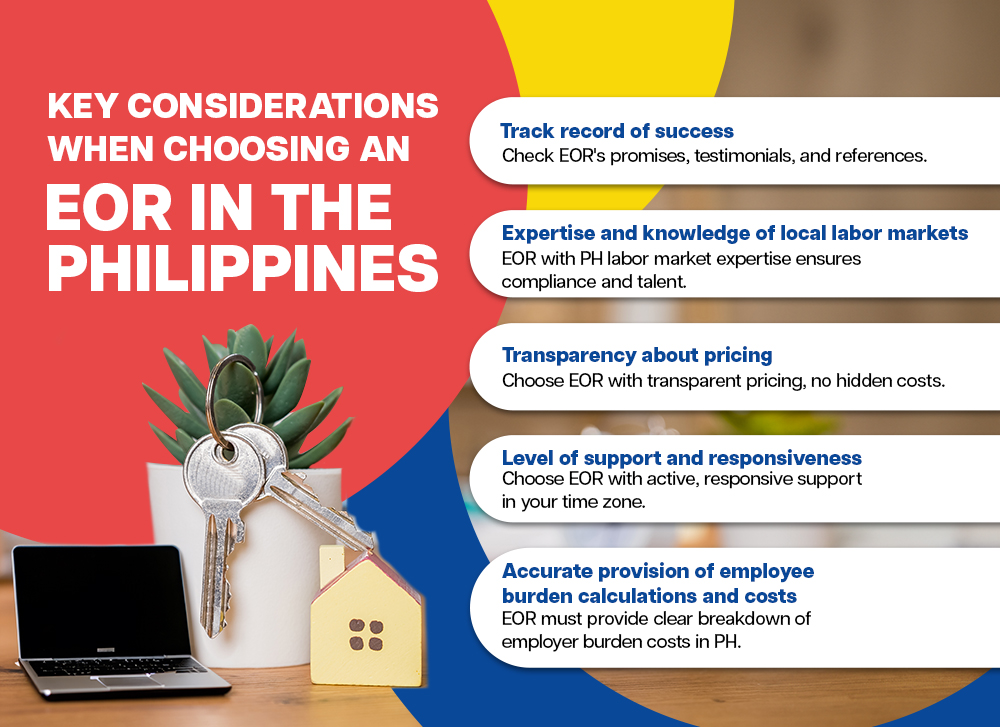
There are several factors to consider before you choose an Employer of Record in the Philippines.
Track record of success
You must ensure that a potential EOR of your choice delivers on its promises. Search for customer testimonials and check references from existing clients to ensure that they’re happy with the services provided by their Employer of Record.
Expertise and knowledge of local labor markets
An Employer of Record must have first-hand knowledge and experience in the Philippine labor market to ensure that you have a competitive advantage when it comes to acquiring top talent while staying compliant with local regulations.
Transparency about pricing
Partner with an Employer of Record that is transparent about their pricing. They should share any additional setup or fees and taxes to ensure that your budget is not impacted by hidden costs.
Level of support and responsiveness
Your chosen Employer of Record should be active and responsive in supporting you and your team. This can be determined by how effectively they respond to your queries and provide timely support to your local workforce in the proper time zone.
Accurate provision of employee burden calculations and costs
Employer burden calculations in the Philippines include costs such as social contributions and value-added tax (VAT) requirements. The Employer of Record must give you a clear breakdown of these calculations to inform you of the labor requirements in the Philippines.
Philippine Labor Laws and Regulations
We’ve shortlisted some of the most important Philippine labor laws and regulations to remember. A credible Employer of Record will incorporate these requirements into your employment processes to ensure compliance with local labor laws.
Security of Tenure
Employees have the right to job security. They may not be dismissed due to unjust and unauthorized causes. An employer must implement due process, which includes extensive investigation, before enacting an employee’s dismissal. There is typically a probationary employment period where employees must meet specific KPIs before being qualified for regular employment.
Work Days and Hours
The standard workday for Filipino employees is eight (8) hours with one (1) hour for meals and rest. Employees are entitled to additional pay for working beyond their official work hours.
Weekly Rest Day
While the law doesn’t require an employee’s rest day to be on the weekend, employees are entitled to at least 24 hours of uninterrupted rest day after every six consecutive working days.
Payment of Wages
Compensation must be paid in cash, legal tender, bank transfer or on-site. All forms of wages must be paid directly to employees and given every two weeks, but not exceeding 16 days.
Safe Working Conditions
Employers must provide safety precautions to protect employees from sickness, injury and death.
Right to self-organization and collective bargaining
All employees have the right to self-organize and join a union to participate in collective bargaining, which is the negotiation process for resolving an issue between the employer and employees.
Employment Contracts and Agreements
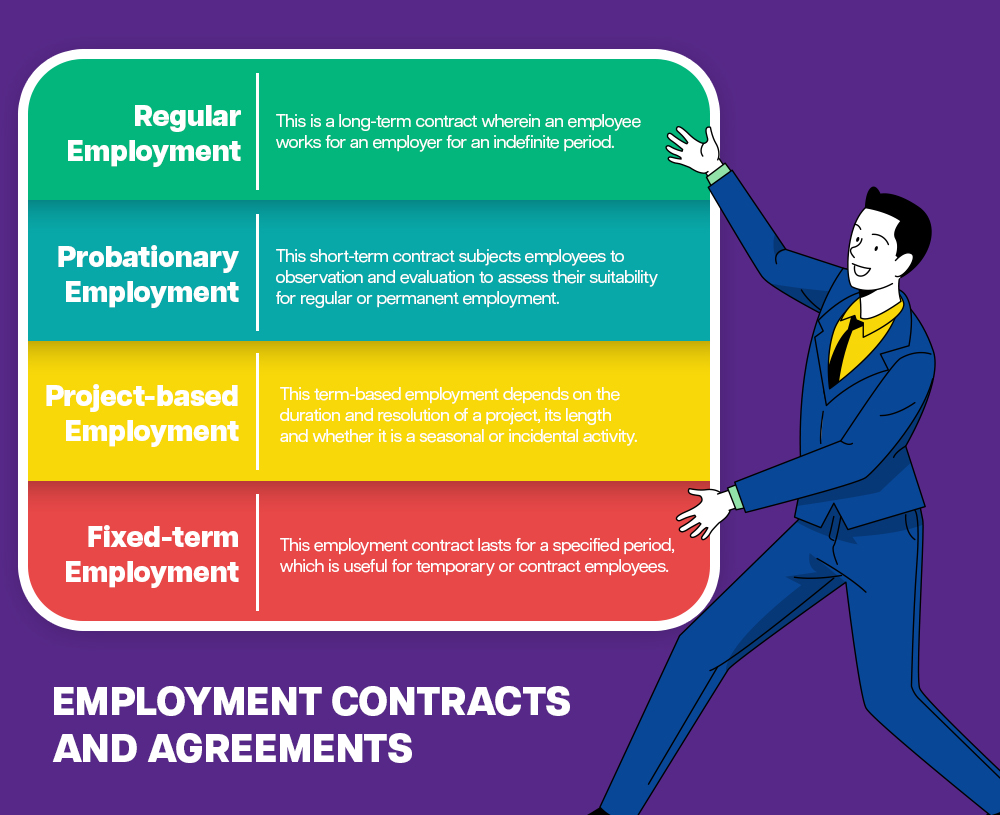
In the Philippines, there are several categories of employment contracts based on the nature of that employment. Your Employer of Record should be able to create an employment contract and find the right staff for your business needs.
Regular employment
This is a long-term contract wherein an employee works for an employer for an indefinite period.
Probationary employment
This short-term contract subjects employees to observation and evaluation to assess their suitability for regular or permanent employment.
Project-based employment
This term-based employment depends on the duration and resolution of a project, its length and whether it is a seasonal or incidental activity.
Fixed-term employment
This employment contract lasts for a specified period, which is useful for temporary or contract employees.
Compliance with Taxation and Social Security Requirements
Employers in the Philippines must adhere to local payroll compliance regulations.
The four main statutory contributions employers deduct from employees’ salaries, which an Employer of Record can manage to ensure compliance and accurate deductions.
Income tax
Employers don’t contribute to their employees’ income tax but act as withholding agents by deducting income tax from their employees’ monthly salaries.
The Philippines use a graduated income tax comprising six tax brackets:
- ₱0 to ₱250,000: 0%
- ₱250,001 to ₱400,000: 15%
- ₱400,001 to ₱800,000: 20%
- ₱800,001 to ₱2,000,000: 25%
- ₱2,000,001 to ₱8,000,00: 30%
- Over ₱8,000,000: 35%
Social security
The Philippines’ social security system (SSS) is an insurance fund that protects employees from financial burdens related to disability, maternity, sickness, old age and other contingencies. The monthly contribution rate is 9.5% for employers and 4.5% for employees, with the amount capped above a monthly salary of PHP 29,750.
Philippine Health Insurance Corporation (PhilHealth)
Employers must contribute to the Philippine Health Insurance Corporation (PhilHealth), the state health insurance fund for employees. The total contribution rate is 4% of the employee’s gross income, with the amount capped above PHP 80,000.
Home Development Mutual Fund (HDMF)
The Home Development Mutual Fund (HDMF), also known locally as the Pag-IBIG Fund, is a government-guaranteed savings fund for employees to help them finance their new homes. Monthly contributions are mandatory for SSS-covered employees, and both employers and employees contribute PHP 100 to Pag-IBIG Fund.
Other Employee Benefits
Here are other employee benefits that employers must consider if they will legally outsource their staff in the Philippines.
- 13th-Month Pay
- Overtime Pay
- Premium Pay
- Night Shift Differential
- Separation Pay
- Retirement Pay
- Leave benefits
Probation and Termination
According to Art. 281. of the Labor Code of the Philippines, the probationary employment of an individual must not exceed six months from the date they started working.
Grounds for termination of an employee
An employer must ensure they have just and authorized cause for dismissing an employee. The following reasons can be considered grounds for termination of employment:
- Serious misconduct
- Willful disobedience
- Gross and habitual neglect of duty
- Fraud or breach of trust
- Commission of a crime or offence against the employer, his family or representative
Employer of Record vs. Other Employment Solutions
An Employer of Record is the most advantageous employment solution for businesses that want to scale efficiently, remain compliant and provide a great work experience for their employees.
We’ve shortlisted the most common types of employment solutions in the Philippines and why you should choose to partner with an Employer of Record.
Employer of Record
An Employer of Record is ideal for small to medium businesses, as an EOR typically does not require you to hire a minimum number of employees after partnering with them. While an Employer of Record will handle the heavy lifting of HR-related administrative tasks, they will ensure that you are still included in the employment processes.
Your EOR will also handle the compliance requirements of outsourcing employees without requiring you to build a local incorporation and entity to hire, employ and manage your staff legally.
Business Process Outsourcing
Similarly to EORs, business process outsourcing (BPO) providers allow you to legally hire remote staff without having to set up an entity.
But instead of outsourcing individual employees, a BPO provider takes care of your team selection, salary offer, training and hiring and firing of your team.
Typically used by big brands who do not require operational control of their offshore team’s day-to-day operations, this means that while BPO services can provide mass employment, they can’t guarantee quality service and output. Because BPO providers often outsource entire departments or teams, you cannot handpick individual employees or provide proper training for them.
Setting up a Legal Entity
Setting up a legal entity in a foreign country allows a business to take on all employer responsibilities, including HR, payroll, and legal compliance. This gives business owners complete control over their employment processes while staying compliant with local labor laws and regulations.
However, establishing a legal entity can take several months, which can slow down a business’s market entry. It also requires a significant initial investment and ongoing costs to maintain the entity. This is not ideal for businesses that want to scale quickly and cost-effectively.
Employer of Record Benefits
There are three key benefits to partnering with an Employer of Record.
Mitigating Legal and Compliance Risks
As the designated employer for your team, your Employer of Record is responsible for the legalities of your employment processes. They will ensure that your business is compliant with local laws and regulations while mitigating legal risks.
Streamlining HR and Administrative Processes
An Employer of Record will have a team of experienced HR professionals responsible for streamlining and developing your HR and administrative processes. This enables you to focus on developing the core competencies of your business.
Enabling Flexibility and Scalability in Workforce Management
Your Employer of Record can help you retain top talent and keep employees engaged, ensuring that you maintain high performance to enable growth and scalability for your business.
How to Engage an Employer of Record in the Philippines
There are three steps you can take before you start engaging an Employer of Record in the Philippines.
Evaluating Your Business Needs and Objectives
What are the short and long-term goals you want to achieve for your business? Knowing your objectives will help you identify the staffing requirements you need to address as well as the employment processes you need to build.
Selecting a Reputable Employer of Record Provider
Do your due diligence when it comes to searching for a dependable EOR provider. Check references from existing clients and make sure that a potential provider has similar values and principles to your business.
Contracting and Onboarding Process
An EOR provider must provide a clear and seamless contracting and onboarding process if you decide to partner with them. This ensures that you are aware of the employment processes they have in place for your team.
Case Study: Daivergent builds a global remote working culture with Remotify
Daivergent is an all-digital job-creating platform for the disability community, helping neurodivergent individuals transition into adulthood by equipping them with the necessary skills for employment, social interactions and independent living.
As its Employer of Record, Remotify strengthens Daivergent’s remote global culture by ensuring that its workforce is fully engaged and supported in the staff’s HR needs.
"Remotify supports us by making sure we don’t have to do anything HR-related. Everything from salary verification or handling an off-boarding of an employee and understanding the legal and administrative risks. Being able to trust Remotify allows me to focus on growing my business." — Byran Dai, CEO and co-founder of Daivergent
Frequently Asked Questions
1. What is the role of an EOR?
An Employer of Record (EOR) acts as the employer for an organization’s employees. An EOR handles the administrative HR tasks within an organization so that business owners can focus on more important tasks.
2. How does an Employer of Record differ from traditional employment?
International organizations are required to set up an entity within a country if they want to legally hire local employees. This is a costly and time-intensive process. Utilizing an Employer of Record allows businesses to skip all the hassle while ensuring that they stay compliant with local labor laws as they build their team in the region.
3. What industries can benefit from EOR services in the Philippines?
An Employer of Record can be useful in almost any industry, but five types of businesses will maximize the benefits of EOR services:
- Startup companies
- Small to medium enterprises
- Companies in fast-paced industries (e.g. tech and digital marketing)
- Companies with project-based needs
- Companies seeking to test new markets
4. How can an EOR help with workforce scalability?
An Employer of Record can help you downsize or expand your team, depending on your business requirements. A partnering EOR will also ensure that you have the necessary HR-related processes in place for seamless transitions for both new and exiting employees.
5. What are the cost implications of engaging an EOR in the Philippines?
International businesses can save up to 70% when they outsource in the Philippines. Utilizing an Employer of Record also ensures a quick deployment of local employees in the organization.
With the rapid digital shift that is happening to the workforce, we can say that the future of a diversified and borderless remote workplace is already taking place. Not only did this shift encourage inclusion in teams, but has also been proven to be a cost-effective strategy to get the best talents while having a more diversified representation for connecting with your customers. This is why more and more businesses are investing in hiring and managing remote teams globally.
The most common way businesses successfully outsource is by partnering with outsourcing agencies such as Business Process Outsourcing (BPO) or Employer of Record (EOR) companies. Most businesses engage either of these two types of outsourcing agencies to hire remote employees efficiently.
But what is the difference between an EOR and a traditional BPO, and which one is best for your business? In this article, we’ll talk about the pros and cons of EOR and BPO to help you assess which type of outsourcing agency is ideal for the services you need.
What is a Business Process Outsourcing (BPO)?
Let’s discuss what a Business Process Outsourcing or BPO is first.
A BPO is an outsourcing solution where a company subcontracts its business functions to a third-party provider. Despite initially being for manufacturing companies, other industries also started contracting BPOs for back-office and front-office functions.

Back-office functions of a BPO support the core operations of a company, including the IT services, accounting, payment processes, human resources, and payment processing. Meanwhile, the front office functions include all the business functions that connect with customers like sales, marketing, and tech support.
Pros:
- Predictable cost. The pricing structure of your BPO provider’s services will be agreed upon in advance, and you will always know what to expect. This typically includes office and equipment costs.
- Process management. With BPOs, you are provided with a team or department based on your requirements, and management of internal processes within the department is managed for you.
- Saves you time. With a managed for you type of service, outsourcing through BPOs allows you and your business to free up more time for other important functions.
- Business flexibility. BPOs provide you with more flexibility to grow or downsize your team anytime you need to.
- No need for local incorporation. BPO companies can take care of the outsourcing process that you need to hire Filipino remote employees. However, note that instead of outsourcing individual employees, it is more about engaging a third-party service for a department function.
Cons:
- Lack of Control and Connection When outsourcing through BPOs, you outsource a team and internal processes within the team. This means that you will not have full control over how things are done, who your employees are, and the culture within your outsourced team. This may sometimes backfire when you want to retain a corporate culture unlike when you engage with Employer of Record companies.
- Comes in Teams or Departments. Engaging with BPOs typically means you are outsourcing entire departments on the onset for your business processes. This may come to a disadvantage if you are only looking to outsource specific and a hnadful of people.
- Lack of company and product knowledge. Outsourcing talents through BPO means that your team may experience a lack of knowledge and product expertise compared or absence of proper onboarding compared to hiring people through EOR services.
- Can’t guarantee quality services. If the job needs quality services from your outsourced employee, partnering with BPO may not be the right choice. Yes, they can provide you with bulk employees as soon as you need them but it can also compromise the skills and knowledge of your team with their job due to lack of training.
What is an Employer of Record (EOR)?
Now that we know about BPOs. Let's discuss what an Employer of Record or EOR can do for you.
An EOR is an outsourcing provider that handles the legal and administrative tasks that come with hiring employees remotely. Typically providing a simple and efficient option for businesses to legally employ foreign talents without having the need to set up a new business entity in the country they are outsourcing from to avoid violating any labor grounds.
Simply put, an EOR helps in carrying out legal and regulatory requirements of hiring, employment, payroll, and other human-resource-related tasks.
Pros
- More control over your team. Unlike BPOs, you have full control over who gets hired, fired, or promoted within your organization. You have complete control over your team’s day-to-day, projects, and schedule giving you a better vision of your team’s performance.
- Small to Medium Businesses. With an EOR, you can hire as little to as many employees as you require. There is usually no minimum number of employees you need to add after a certain time frame after engaging with an EOR company.
- Saves you time Similar to BPOs, engaging with an EOR can help free up your time leaving you with more bandwidth to take care of more important business functions, such as growing your business, rather than spending your time finding the right team and handling administrative work.
- No need for local incorporation. You don’t need to go through the long process of building local incorporation and entity to hire, employ, and manage your employees legally. An EOR will handle all the legalities that come with outsourcing employees and make sure you are completely compliant with the local labor laws of the country you are outsourcing from.
- Works with you More and more businesses prefer to be included in the hiring and employment process without having to be the ones to source employees. EORs will work hand in hand with you from hiring start to finish, and manage recurring payroll and HR administrative tasks for your remote team.
- Transparency on cost You dictate the salary of your employees and pricing is usually agreed upon in advance, so you will never be surprised with hidden costs or fees.
- Ensures quality services. EOR companies will be responsible for finding candidates and conducting initial interview but the final interview and selection process is yours to own. This means that you can still assess the skills and experience of the employees that you’ll employ for quality services. You will also be able to train your employees the way you want it done and align the quality of work and services they’ll provide with your needs.

Cons
- You manage your team. Unlike BPOs, an EOR will only handle payroll, legal processes, and HR administrative tasks for you. While this ensures you have complete control over your employees, it also means that day-to-day management will be handled internally within the organization.
- Can’t offer bulk employees in limited time. To ensure that all the outsourced employees are experts in their field, EOR companies tend to veer away from mass hiring and may take time assessing candidates to ensure they are a fit for each role required, with proper background check and legal compliance in consideration. With an EOR, the hiring process for finding the best candidate may take a few days to weeks depending on the urgency which can be laid out from the onset.
Which one will work for you?
Many businesses are unaware of the advantages and disadvantages when choosing between EOR and BPO for their outsourcing requirements. However, the key is to assess your business’s needs and goals and check which type of outsourcing provider suits you best.
If you want a “managed for you” business process and outsource an entire department, then a BPO is the best option for you. However, you have to be ready to pay a higher price due to office, equipment, and management costs. It will also work if you don’t want control over your people’s salary. Once you’re settled in with a BPO company and paid for their services, they will be the one to decide how much your employees would get.
On the other hand, if you simply want to outsource and have your team’s payroll and local HR administrative tasks taken care of, then EOR is for you. It is a perfect choice if you still want to retain full control over your remote team and maintain the company’s culture within each department.
Ultimately, one of the reasons why most companies are switching from partnering with BPOs to EORs is the freedom to manage their own outsourced employees. More and more businesses prefer to be included in the hiring and employment process without having to be the ones to source employees.
Considering that almost 63.3% of businesses claim that retaining employees is difficult, showing your company’s concern for employees whether face to face or remote can help in retaining outstanding and loyal workers. EORs like Remotify can even help you provide HMO and other benefits for your employees.
Both EORs and BPOs have their own sets of advantages and disadvantages, and choosing between them should be based on your business needs.
Outsourcing simplified
If you want to outsource and diversify your workforce and still have full control over your remote team minus the payroll headache, HR administrative tasks, and legal processing, then you need to partner with a reliable EOR company in your target country.
Remotify also offers additional services such as GDPR and cybersecurity training, employee background check, and may help you provide HMO and laptops for your outsourced employees.
To learn more on how you can outsource Filipino talents through an Employer of Record, you can check out Our Services for more information.
About Remotify
Remotify is your next-generation solution to growing your team remotely and cost-effectively in the Philippines.
Through our Employer of Record service, Remotify will employ and payroll your workers in the Philippines and do the heavy lifting for you. We will take care of local HR, compliance, attendance tracking, payroll, and reporting so you can focus on what is most important: growing your business.
This means you can quickly and securely hire employees in the Philippines, attracting top talents and keeping them engaged through the process. At the same time, you avoid the overhead of establishing your own entity.
From complex local tax and labor laws to in-country capital requirements and compliant HR management, payroll, and benefits disbursement, getting started in a new country to tap on its low cost and great talents can be a time-consuming endeavour. But with the right partner, it doesn’t have to be. Remotify is here to keep things simple for you.
One of the main concerns of companies and managers when allowing their employees to work remotely is their productivity amid the distractions at home. However, if you are a remote employee and you want to keep a good relationship with your employer, it is important to ensure excellent performance at all times.
In this article, we will let you in on some tips and the top habits you need to lose to improve your remote work performance. Read on to know more.
Habit #1. Being distracted from home.
In a remote work setup, one of the main issues would be the distractions from our house. Whether it is your children, your housemates, or even your dog, it is easy to get distracted when you hear irrelevant noise while working. Not to mention the expected and unexpected chores that you must do like cooking, cleaning, or even accepting your deliveries.
However, there are some effective things that you can do to deal with distractions at home. Here are some of them:
- Let your housemates and social media friends know when you are working.
It is important to let other people know when you don’t want any distractions. You can tell them in advance, put a sign on your door, or change your active status on social media. This way, you can prevent yourself from engaging in nonwork-related discussions with other people during your work schedule.
- If you have young kids, getting help is important.
If you have young children, chances are you will be repeatedly interrupted while you’re at work. In this case, remind your spouse, or the people who are there to offer help about your dedicated working hours However, if they are also working, then it might be good to consider seeking help from your relatives or trusted nannies.
- Set a dedicated working space at home.
If you want to avoid distractions at home, you should get a dedicated working space. It can be your bedroom or just a small space in your house corner, whichever works best. Just make sure that it is away from the noise, television, the dining room, and other communal areas in your home where people usually spend time unwinding.
- Keep consistent work hours.
Having consistent working hours is important not only for your work-life balance but also for your productivity and focus. Simply don't answer unrelated calls during work to avoid distractions. You can set a callback message letting people know that you cannot answer them due to your work schedule.

- Escape.
If all else fails, you can try working from a coffee shop, library, or co-working space near your area. Due to the influx of home-based workers these days, there are a lot of coffee shops and co-working spaces that offer a conducive environment for working with a stable internet connection
Habit #2. Mismanaging tasks and losing priority.
One of the main disadvantages of working remotely is the lack of face-to-face connection with managers This means that workers are more prone to mismanaging their tasks and losing priority without a properly working system. This is especially true for those who are working in different time zones with flexible schedules.
However, there are effective ways to still stick to your schedule and cross out your to-do’s at the right time. First, it is important to limit the number of your tasks each day and arrange them based on their importance and the due date for prioritization. You can try the Eisenhower matrix or do 1 big thing along with 3 medium things and 5 small things to do per day by following the 1-3-5 rule.
You can also use project management applications that will help you get better insight and control over your tasks. Just make sure to still have time for taking breaks to avoid losing energy and motivation to finish your tasks.
Habit #3. Being out of the loop in the remote workplace.
When working remotely, one of the most important things that every employer, manager, and employee has is an effective communication system. Unlike in a traditional workplace, it is easy to feel out of the loop and disconnected from your coworkers. Some may even feel paranoid that other people are having meetings and making decisions without them. Not to mention the terrible differences in time zones which usually lead to miscommunication.
To avoid exclusion in the workplace, make sure to have an effective communication system that will work for everyone. Hold virtual meetings every week that will overlap with everyone’s schedule to not miss out on anything about the recent news and issues about work. It is also important to build a culture of inclusion for remote workers by giving them the chance to be more proactive in speaking up.

Habit #4. Messing up work-life balance.
According to a study from Harvard Business Review, about 40% of 215 supervisors interviewed are not entirely sure about their capabilities to manage remote workers. One of the reasons for this is their fear that employees will just slack off without in-person oversight. However, that is far from the truth and most remote workers are more likely to overwork, messing up their work-life balance.
A lot of companies often overlook the possibility of overworking their employees in a remote work setup. Thus, most employees tend to forget to have breaks and lose their sense of time even after their working hours. This is a big mistake that often leads to fatigue, sickness, and contrary to expectations, unproductivity.
So, to prevent messing up your work-life balance, make sure to be more organized with your time management. Set appointments on your calendar for going out for a simple stroll or eating out after your shift. You can also set an alarm for breaks after every major task you were able to finish.
As mentioned earlier, it is also best to create physical boundaries between you and your workspace. While some choose their bedroom to avoid distractions, some set their dedicated workspace at another isolated area that they can easily shut off after their work. If this is not possible, then you can just simply shut off your laptop and put it out of your sight while resting.
Habit #5. Isolating yourself from the team.
This is almost the same with feeling out of the loop. The only difference is that this one is more related to your personal and social life in your virtual workplace. Unlike in the traditional office, there are no more impromptu “watercooler” interactions and it is almost impossible to share meals with your co-workers. This leads to a feeling of isolation from the team.
But, to avoid this, having social breaks in your schedule with those who reside near your area can make a difference. You can also try visiting a co-working space or coffee shops that help you feel less alone while working. Some companies hold ice-breakers and catching-up meetings for employees to let them talk about nonwork-related things once in a while.

Key Takeaways
Although some companies are still wary of implementing a work-from-home setup, it can improve the productivity of employees when done with the right mindset and habits. This is the main reason behind Remotify’s I.N.S.P.I.R.E principles.
By partnering with us, we can help remote employees get more insights and tips on how to handle their work-life better and promote productivity even as they work from home. Of course, we also offer other services such as HR tasks and payroll management for companies. To know more about this, check out this page or send us an email at hello@remotify.ph.
On the journey to becoming a remote team, there are many things to consider. Creating job descriptions for remote positions is an essential ingredient to making sure you get the right people in your team. This can be challenging since there are no face-to-face meetings with potential employees and the co-located team has no way of knowing if they would be a good fit. As with all companies, it is essential to write clear job descriptions to attract the best talent.
In this article, we will provide you with a detailed guide to craft the best job descriptions part by part. From the job title itself up to the compensation and benefits, we will help you write your job ad and attract the best candidates that will help your company grow.
Job Title
It is important to make your remote job titles as specific as possible. Rather than generic ones, having targeted job titles is more effective in catching job seekers’ attention. Include key phrases that don’t only describe the role but also answer what people normally search for in job sites.
Most of the time, the reason why recruiters are having trouble filling their vacancies is because of their overly creative and absurd job titles. If you scroll through job sites, you’ll often see posts searching for “rockstar” virtual assistants, SEO “Ninja”, and social media marketing “guru.” But instead of catching people’s attention, this just turns off professional candidates.
While it is true that creativity will help your job title stand out, don’t make it too complicated and misleading to the point that you’re missing out on competitive candidates who are searching for the same job. What you can do is integrate industry-standard language that only real practitioners will know in your titles.
For example, you may niche down when looking for an email marketer and make it, “Klaviyo Expert Email Marketer. You may also just plainly go for job titles like “SEO Expert,” “Analytics Manager,” or “Social Media Specialist.”
Job Summary
When writing a job description, start with a strong and attention-grabbing one-to-four sentence summary. Your overview should perfectly describe the remote position’s main function, its contribution to the company, and how it will help them in their career growth. You should also discuss the expectations for the candidate you will choose.

Most importantly, you should be clear about the location of the job and that it’s a remote work setup. This way, you can filter out all the employees who are not suitable for a work-from-home position and keep those who are comfortable with this.
Responsibilities and Duties
Now that you have your target applicant's attention, the next step is to properly lay out the responsibilities and skills in your job description. In this one, you just have to remember the number one rule in writing job posts: TRANSPARENCY.
List down all the core responsibilities of the position and make sure to make it as concise as you can. Rather than writing in long sentences and paragraphs, emphasize the duties that may be unique to your organization in dot points. For example, if your company is focusing more on podcasts and social media for your marketing, make sure to include this.
Moreover, you should highlight the day-to-day activities that your candidates should expect upon working. This will give them an idea of how their daily work should look like and if they can handle the workload. This way, they can distinguish if they are the perfect fit for the position and will help sift out those who have higher tendencies to leave your company after a few months.
Lastly, indicate where and to whom the position should directly report and how they will function within the organization. It is important to let them know the importance of their role and how they can make an impact on the business.

Qualifications and Skills
Now, let’s talk about how you should indicate the list of hard and soft skills required for the position. Job descriptions should be as concise as possible and this includes the list of qualifications. This will help your audience know if they are fit for the role and if they possess the skills needed for the job. If you fail to include the specific skills and knowledge that’s required for the role, you might miss potential candidates or attract underqualified candidates.
When writing a job description, make sure to specify the level of education, previous job experience, and technical skills you are looking for in the candidate. Let your target candidates know the software and applications you are expecting them to know or use. If needed, you can also include the certifications that aspiring employees should have before applying.
Of course, you should also include the soft skills such as communication, critical thinking, problem-solving, and personality that suit your company culture best.
Salary and Benefits
Now that you have an attractive, clear, and concise job advertisement copy, it boils down to the exchange. Of course, this would be the most obvious part that any job seeker will look for, so as much as you can, you should make this part highly attractive while staying realistic to your offer. Unlike before, applicants expect to get an idea about the salary rate from the job description. If your offer varies depending on experience, you can give a range.
Moreover, listing down all the perks and benefits that a candidate can have from the position would attract more job seekers to apply. If you’re really interested in providing your team with amazing perks and benefits, you must know the common benefits that you could offer. This may include more days for paid leaves, bonuses, and insurance. A benefit that most remote employees get attracted to almost immediately is health benefits such as HMO provision among other perks.
In the Philippines, it’s a standard that all employers pay for the social benefits of their employees like SSS, Pag-Ibig, and Philhealth. Aside from this, employers are expected to manage their employee’s taxes along with their payroll and all employees must have their 13th month pay by the end of the year. These are some of what employees in the Philippines get as a standard from their employers which play a big factor when it comes to staying in jobs. We wrote an entirely separate blog discussing employer responsibilities in depth which you can check out here.

This is the biggest factor employees consider when thinking about shifting to remote work. There are a lot of skilled and highly experienced employees who consider shifting working as international employees but stay in their current jobs simply for this reason alone.
We can help you attract the best employees
Providing all these benefits was previously only possible when you register your company as an entity in the Philippines. However, with the help of EORs like Remotify, complying with the legal requirements in remote employment without building an entity in the country is possible and proves as a very convenient choice for most international SMEs
Our services include complete local HR management for all legal compliance, compensation and benefits computation, and management. We also help employers provide HMO and medical benefits to their employees through our partner providers. To know more about our Services, visit our website or send us your inquiry at hello@remotify.ph. We’ll be more than happy to assist you from the start to the end of your hiring process.